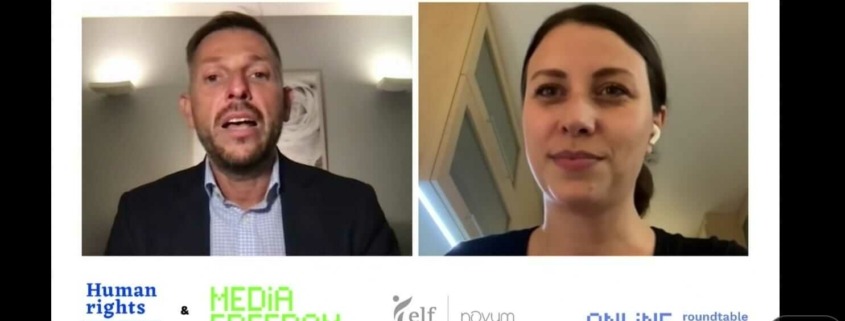On Thursday, 18 November 2021, MEP Irena Joveva was invited to be a speaker at an online panel on human rights and media freedom organised by the European Liberal Forum and the Institute Novum. Respect for human rights is inseparable from democracy, which itself is based on the free expression of different views. The media play a crucial role in this by ensuring the flow of diverse and accurate information that reaches a wide spectrum of society. In recent years, both democracy and freedom of expression have been declining and the media are increasingly facing pressure on their independent work. At the same time, the widespread use of social media facilitates the proliferation of fake news, misinformation and manipulation, which, unfortunately, has been exacerbated by the COVID-19 pandemic. The debate focused on the initiatives launched and discussed at the EU and international level to provide a clear and decisive response by the democratic community and on the examination of proposals for actions to be undertaken.
Irena Joveva first responded to concerns about the state of media freedom in Slovenia and in the EU. She strongly condemned political and other pressure on journalists and media aiming to suppress independent reporting. “The increasing pressure exerted on journalists today can ultimately lead to extreme cases such as the murders of investigative journalists in Malta, Slovakia, Greece and elsewhere,” she stressed. The MEP believes that only independent and objective information can provide the right solutions to the challenges that arise. In her opinion, the press and journalism in general are also threatened by wider factors such as lower readership of classical print media and the shift to digital platforms. Local media compete with the largest media outlets on the global market, and users expect information free of charge, while stable digital media funding models have yet to be developed. In this area, Joveva highlighted a solution: “To a certain extent, at least, the area is governed by the Copyright Directive, which gives publishers some negotiating rights, but to date only big countries have made progress. A lot of legislation is already in place or being drafted, but it attempts to address different issues to create a comprehensive and horizontal legislative framework with a feasible solution.”
In addition to these wider factors, the illiberal populists attempting to destroy media freedom and the commercial interests of owners who put pressure on editorial independence also lead to a decline in media freedom.
“In Slovenia, this trend is already visible. The Janša Government is exerting as much pressure as possible on our public media, it has suspended funding to the national press agency, it is appointing obliging editors and a director to the public service broadcaster, directing advertising revenues to its party’s propaganda media, while at the same time denigrating and discrediting independent critical journalists at every opportunity,”
she added and also expressed her concern about the situation in Hungary and Poland, where the public service media have largely been forced into subordination. Joveva counts on the adoption of a legal framework at the EU level with sufficient safeguards that will provide journalists and editors with the necessary conditions and power so that they can defend themselves freely and carry out their work without interference from politics or their media owners.
“The atmosphere in Slovenia is increasingly radical, which is poisoning people-to-people relations. I feel the hardship of people in difficult times, especially during the COVID-19 pandemic. Responsible decision-makers working in the civil domain should address problems and act as quickly, clearly and decisively as possible,” she stressed in her answer to a question about xenophobic attacks, harassment and intimidation, which are oftentimes also directed at her. Such situations and the fictitious creation of confrontation can be abused by individuals or the media for mounting attacks of a personal nature that feed their electoral base and strengthen their visibility. When substantive arguments are exhausted, people resort to a personal level, which speaks volumes about them.
Responding to a question about the decline in press and media freedom in some EU Member States, Joveva said that both the Parliament and the Commission were well aware of that. Next to the Copyright Directive, she underscored the importance of the Audiovisual Media Services Directive, which affords greater editorial independence, but both directives will need to be fully transposed by the Member States. “The Parliament is currently working on the so-called anti-SLAPP Directive to establish legal safeguards and ensure protection of journalists from strategic lawsuits when legislation is misused to silence journalists and other public oversight bodies,” she added. In this regard, it is important to provide judges with a mechanism to swiftly resolve such legal cases. “Another important piece of legislation to be presented next year will be the European Media Freedom Act, which will be the most comprehensive media legislation aimed at protecting independence in both private and public media. Specific solutions have not yet been articulated, but the act is expected to create full transparency of media advertising — in particular in state-owned enterprises, as well as transparency of ownership,” Joveva explained about the law, to which she, too, wishes to contribute. “It’s time to treat the media sector as it deserves, as it has a huge, if not the biggest impact on democracy itself,” she concluded.





Leave a Reply
Want to join the discussion?Feel free to contribute!